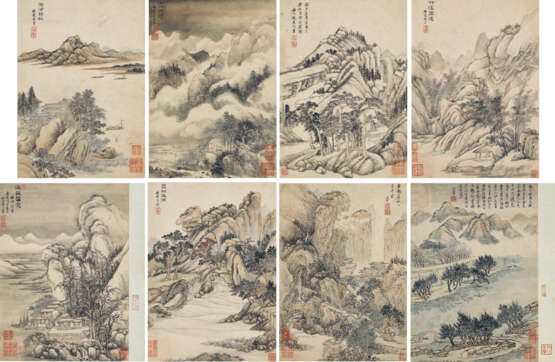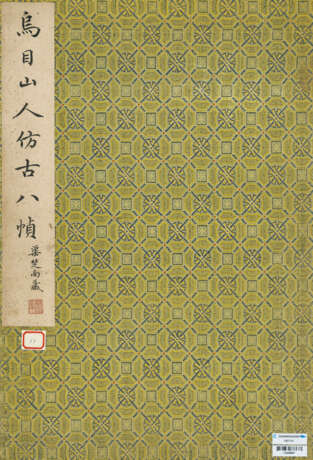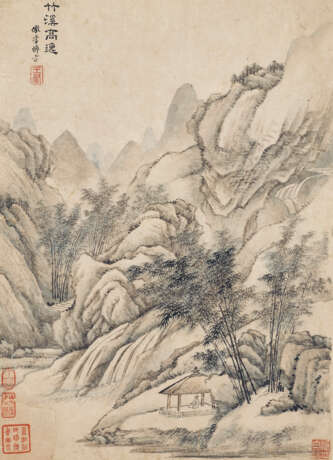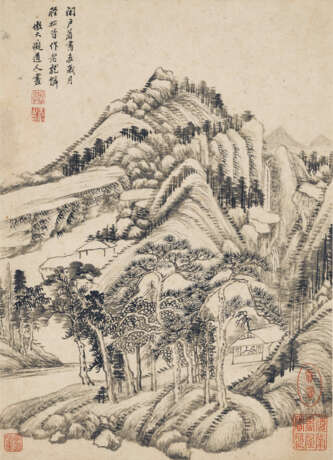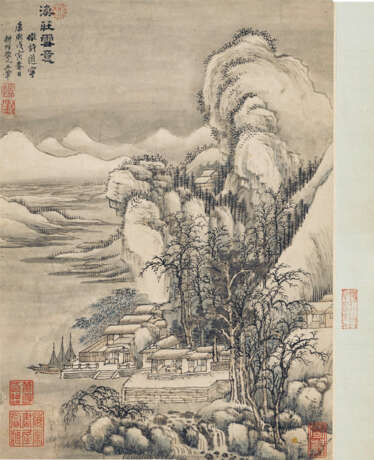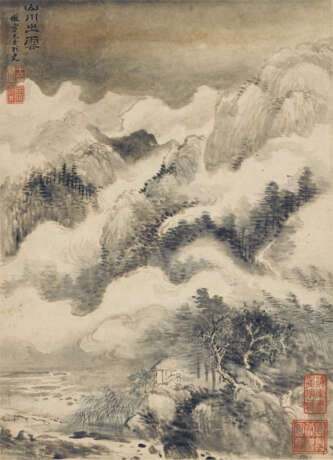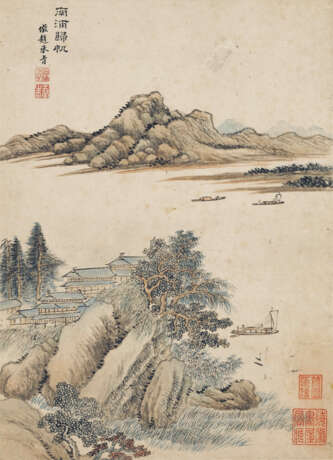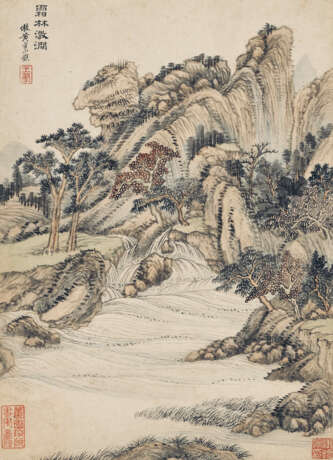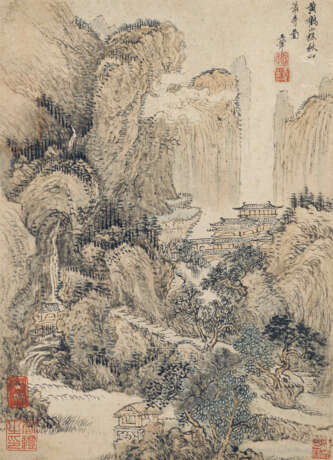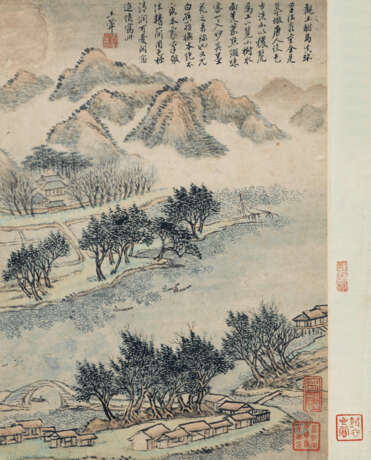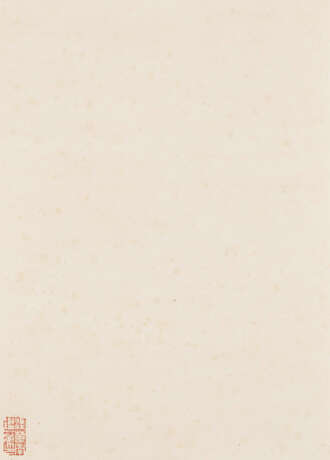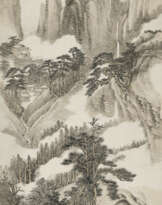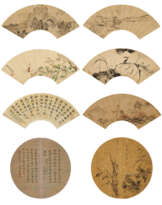ID 1086712
Lot 890 | WANG HUI (1632-1717)
Estimate value
HKD 6 500 000 – 8 000 000
Landscapes after Old Masters
Album of eight leaves, ink and colour on paper
Each leaf measures 36.2 x 26 cm. (14 ¼ x 10 ¼ in.)
Each leaf inscribed and signed, with a total of sixteen seals of the artist
One leaf dated spring, wuyin year of the Kangxi period (1698)
Twenty-three collector’s seals including two of Qu Benqiao (1862-1919) and thirteen of Yue Li (1688-1771)
Title slip by Qu Benqiao, signed with one seal
Further details
Clear and Radiant:
Wang Hui’s path to the Sage of Landscape Painting
A pioneer of the Northern and Southern Schools of Painting theories, Dong Qichang (1555-1636) advocated Southern School’s learning from the Four Yuan Masters, of which his endeavors were inherited by Wang Shimin (1592-1680) and Wang Jian (1609-1677). In 1651, Wang Jian described a folding fan painted by Wang Hui that he viewed in Changshu as ‘one of a kind in 300 years’. He introduced Wang Hui to Wang Shimin and Wu Weiye (Meicun) in October. Thanks to their support, Wang Hui embarked on a successful career towards the ‘Sage of Painting’.
Born to a family of professional painters for five generations, the budding artist studied the Song and Yuan great works in Wang Shimin’s collection shortly after their acquaintance. The master recommended him to collectors and complimented him as ‘an unprecedented artist in 500 years’. In the coming decades, Wang studied about 40 artists of the preceding periods, and imitated hundreds of masterpieces, including 20/27/18/29 works by Dong Yuan/Ju Ran/Huang Gongwang/Wang Meng. Influenced by Dong’s theories, supported by Wang Jian and Wang Shimin and through rigorous archaic studies, Wang Hui defied the tawdry norms of his time and invented a unique style that assembled the aesthetics of preceding periods.
Invited by Wang Yuanqi in 1690, Wang Hui went to Beijing with his pupil Yang Jin. Nominated by Wang Shan and Song Junye in 1691, Wang Hui was appointed the lead imperial artist of the epic Kangxi Emperor’s Southern Inspection Tour, which was completed in 1695. The Crown Prince bestowed Wang four imperial characters - ‘Landscapes Clear and Radiant’ in 1696. Upon returning to Changshu in 1698, he displayed the four imperial characters in his studio and changed his artist’s name to Master Clear and Radiant. Through learning from the classical canons, Wang became a key figure of orthodox painting in early Qing.
Landscape after Wang Meng (Lot 888) was conceived by Wang Hui during his third visit to Beijing, employing the ‘ox-hair’ technique. It was collected by the Japanese samurai and connoisseur Asano Nagayoshi in 1840 during the Tenpo period. In the last century, it was acquired by the owner of Xian Qu Xuan, who dedicatedly graced it for decades.
Studio Amidst Willow Forest (Lot 889) was executed in Wang’s studio Clear and Radiant Pavilion upon returning to hometown. With willows and pines scattered along mountains and shores, it highlights the essence of a pleasant and meditative landscape.
Landscapes after Old Master (Lot 890) is an album of eight leaves, collected by Shanxi magnate Qu Benqiao of late Qing, and was modelled on the seasonal landscapes by old masters Li Tang (Xigu), Huang Gongwang, Wang Meng and Xu Daoning. Every ethereal scene attests to Wang Hui’s perfect embodiment of the classical spirit.
Landscapes after Ju Ran (Lot 828) from the Liu Jing Xiu Tang collection is a brilliantly rendered snowy landscape with old pines and secluded pavilions. With two poems inscribed by Yun Shouping at the end and colophons by Wang Zhuan, this gem was executed by Wang Hui’s in his prime years.
Wang Hui’s decades of diligent learning, diverse styles and innovative vision can be summarised in his own words in Postscript to Landscapes Clear and Radiant - ‘I bring together brushworks from the Song dynasty, contours from the Song dynasty, and vitality from the Tang’s dynasty, to consummate the ultimate ideals’. These reveal Wang’s artistic purpose and being a faithful follower of Dong’s painting theories.
| Artist: | Wang Hui (1632 - 1717) |
|---|
| Artist: | Wang Hui (1632 - 1717) |
|---|
| Address of auction |
CHRISTIE'S 18 Chater Road Central Hong Kong Hong Kong | ||||||||||||||
|---|---|---|---|---|---|---|---|---|---|---|---|---|---|---|---|
| Preview |
| ||||||||||||||
| Phone | +85227601766 | ||||||||||||||
| Fax | +852 2760 1767 | ||||||||||||||
| Conditions of purchase | Conditions of purchase | ||||||||||||||
| Business hours | Business hours
|
